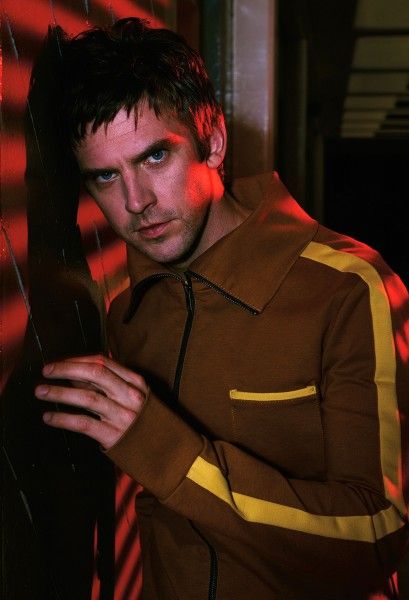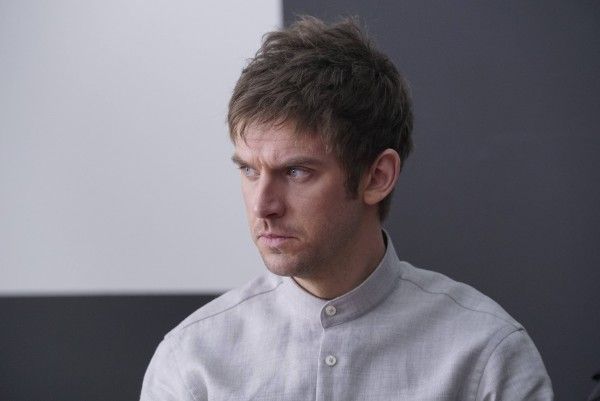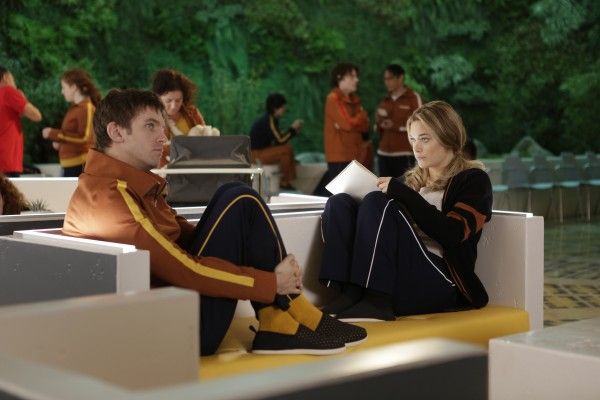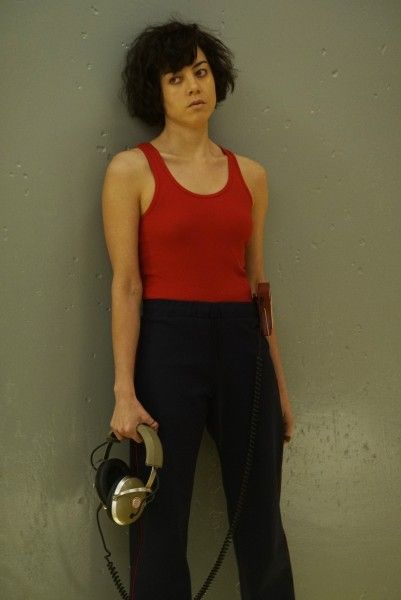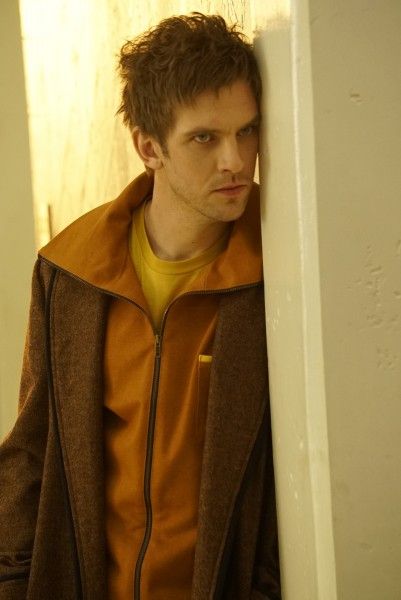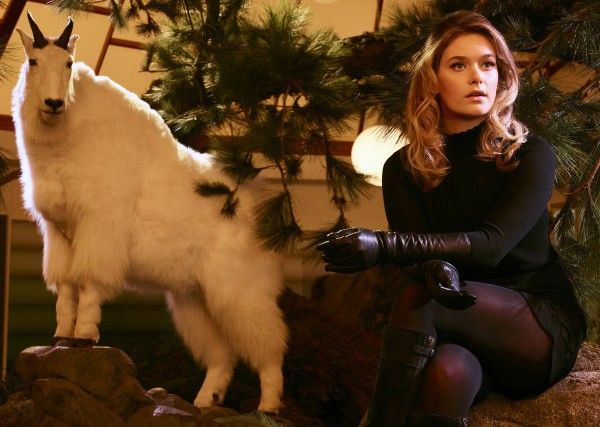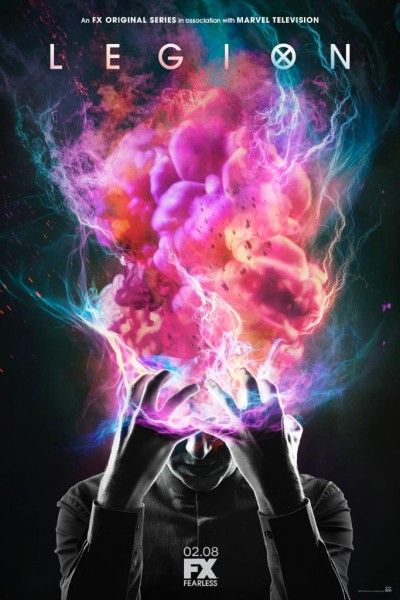Showrunner Noah Hawley, who had such a compelling and original take on Fargo for FX that it’s become one of the must-see shows on that (or any) network, is now taking on Legion, based on the Marvel Comics by Chris Claremont and Bill Sienkiewicz. In the trippy series, David Haller (Dan Stevens) is a troubled young man who was diagnosed as schizophrenic as a child, leading to him being in and out of psychiatric hospitals for years, but he may not actually be sick, at all. When David meets a troubled new patient named Syd Barrett (Rachel Keller), the two are inexplicably drawn to one another and David must confront the shocking possibility that what is happening to and around him is a result of him being more than human.
During a recent conference call to promote the series debut, executive producer/writer/pilot director Noah Hawley spoke to members of the media about developing this unique take on a superhero story, collaborating with the network throughout the development, bringing a sense of inventiveness and whimsy to the material, having such a high-stakes lead character, finding the look of the show, what this genre allows you to explore, how much inspiration he draws from the comics, portraying mental illness, giving his actors extensive music playlists, and how he’s juggling everything that he’s got going on now.
Question: Because there is such a unique approach to the storytelling on this show, was it a tough sell, at all, to tell this narrative from the mental interior of a seemingly schizophrenic mind, and what are the biggest challenges in setting up and telling the story and taking audiences on the journey of a guy who’s one of the most powerful people alive, but who also doesn’t really know what he can do or how to do it?
NOAH HAWLEY: It helped that Fox and FX were interested in taking on this universe, and they came to me. It wasn’t that I was trying to sell them, necessarily. But I also had conversations with John Landgraf about the genre, itself. His feeling, like mine, was that the only reason to take on this genre on FX was if we thought we could make an FX show out of it and do something different than other people were doing. I think they’re hard-wired to look for a different way to tell a story. I think the love story of it is very grounding. When you have a character that doesn’t know what’s real and what’s not real, and the audience is on that journey with him, if you give them something positive to root for, they’ll make you a trade. They’ll say, “As long as this girl is real and this love is real, we’ll go with you, wherever you want to go.” Even though the script and the episode that you watch are the same, they’re very different. Nowhere in the scripts do you feel like the reality looks the way the show looks. It wasn’t scripted to be this hybrid A Clockwork Orange/Quadrophrenia world. That was just part of the development process, once I took it on as a director and started thinking about what the physical laws of the world were and how the powers worked. I wanted to bring a sense of inventiveness and whimsy to the material, as well. As with anything, it exists in your mind, and then you have to execute it and put down on film what you saw in your mind. In the best world, you have a partner that trusts you and goes with you. That said, I created a look-book and had a couple of very specific reference points, and we led them through every step. I put a lot into hair and make-up tests and the music that I use. Every opportunity that the network has to interact with the show should feel like the show. I want them to see how the characters look, how the music goes, and how I’m filming it, so they have a sense of what the show is going to be. There’s a lot of trust, but I also am very collaborative.
Do you see this as the next generation of superheroes on TV?
HAWLEY: My goal was to write a character where the abilities that he has are just a part of who he is. I can’t speak for any kind of movement or sense that this is the next generation. This is just the story that was interesting to me to say, even if you strip the genre out of it, would it still be a great show? Is there something interesting there? This idea of a subjective reality and the down-the-rabbit-hole quality to the story played nicely into his own issues and the fact that he’s spent the last 15 years or so not knowing what’s real. His biggest struggle is to accept that what’s happening to him is real. The danger is, if it’s not and if it’s a psychotic break or a symptom of his illness and he accepts it as real, he may never recover from that. The stakes for him, as a character, are really high, which is what made it so interesting.
Legion does not look and feel like a typical superhero show. How did you come to decide on this particular look for this?
HAWLEY: Some of that came from having to make a choice. The X-Men have started to become period films, so I had to decide if I wanted to pick a period and do the same thing. For someone who has been out of circulation for so long and has been medicated for a long time, his perception of the world may not feel like anything we recognize. Some of it may feel very retro because those are memories that he has, and some of it may feel very futuristic because technology has changed while he was in there. So, it may be today and it may be a city we know, but we can’t see it clearly because he doesn’t see it clearly. That allowed me to create something that was more of a fable, and to play a little more whimsically with the production design and character design on the show.
What does this genre allow you to explore?
HAWLEY: One of the things I’ve always loved about genre, comic books, science fiction and fantasy is that there’s a certain level of playfulness to them, and pure imagination and creativity. Genre allows you a really dynamic place to explore big concepts. If you think of Philip K. Dick, or the work of Neil Gaiman or Alan Moore, these aren’t people who are interested in just writing a classic story of good vs. evil. The revamped Battlestar Galactica created a world where it was the robots who believed in a single god and the humans that did not. It was such a radical idea and a way to explore religion and belief that you hadn’t seen before. I just tried to leave myself open to wild swings of imagination, never for their own benefits, but always to try to enhance the subjective storytelling. And then, I wanted to execute them as practically as possible. If you have a character that can make objects move with his mind, it’s better to see those objects moving. If you’re going to have a kitchen fly apart, it’s better if you composite in separate takes, like one with the character in it, one with everything blowing out of the cabinets. If you do it at high speed, you can shift how fast each of the elements is moving. Your eye can tell the difference between when all of the elements are real and when something is computer generated. My hope was, because I was trying to do something a little more experimental, I felt like what I wanted to offer the audience was something, every week, that would blow their minds a little bit. The promo for next week is always going to have some element, like a set piece or some kind of conceptual place we’ve never seen, where it’s going to make you want to tune in because you want to see, visually, what we’re doing. It’s hard to pull off, and it’s hard to pull off on a TV schedule. All of those elements tend to take longer to put together, but it’s worth it, in creating something you hope no one has ever seen before.
How much inspiration do you draw from the comics?
HAWLEY: I’m influenced, thematically and structurally, on some level. There’s the idea that The X-Men universe is one with a lot of moral greyness to it. It’s not your classic good vs. evil, black and white world, where good is always good and evil is always evil. You have these different dynamics. The central relationship of The X-Men movies is between Michael Fassbender’s Magneto and James McAvoy’s Professor X, also played by Patrick Stewart, as an older man. There’s this dynamic where Magneto wants to rule humanity, or do away with humanity, because he grew up in a concentration camp and he knows how people who are different are treated by society, and he’s kind of right. And then, there’s Professor X who says, “No, we should teach them and learn to live together,” and he’s also right. What’s interesting about that is that you have two points of view that are both right and wrong. That’s a much more interesting dynamic to explore than the moustache twirling supervillain who only wants to do evil, and the heroes that must stop him. In The X-Men world, one can be a hero one day and a villain the next, which means there’s a constant battle for a character’s soul that’s dynamic. I find that really fascinating. That’s what was interesting to me. Even if we took the genre out of it, the idea of a character who’s on a journey that could end either heroically or tyrannically is a really fascinating journey to be on. And then, when you add the genre element into it, then the stakes go up. They’re either going to be a superhero or a supervillain. All of these characters are struggling with that. That’s what was intriguing to me.
How much research did you do into portraying mental illness?
HAWLEY: There was some research that was literally about how schizophrenia works. If you look at a character like Ptonomy (Jeremie Harris), who is what they call a memory artist, that’s an opportunity for me to really think about memory and identity, so I do a lot of reading on those subjects. I’m trying to craft a show around the idea that’s central to The X-Men stories, which is that you have a bunch of young people that have been defined by society that there’s something wrong with them because of who they are and what they can do. And then, they become empowered by going to The X-Men mansion and rewriting their past to say, “These things that happened to me made me into someone strong.” The best elements of the show, for me, are the ones where the physical power also plays into the character dynamic. When Syd’s skin touches somebody else’s skin, things happen that can feel positive or negative, depending. Since she was a teenager, she has gone out of her way not to touch people and, as a result, has been diagnosed with an anti-social personality disorder. That’s not actually what she has. She has this physical ability. But at the same time, she does have an anti-social personality disorder because she is avoiding people and she has a negative feeling about getting too close to people. That, for me as a writer, was the best part to say that this positive ability also has a downside that’s worth exploring in a more existential way.
Why was the area of mental illness so intriguing, as a topic, and do you have concerns about depicting it respectfully?
HAWLEY: I didn’t want to turn mental illness into a cartoon, nor did I want to use it as a gimmick to get into the story. The reason that the show starts with a four-minute montage, taking David from infancy to being a 20-something in a mental institution, was because I think there’s an inherent tragedy here and a reminder that mental illness is something that, for the most part, comes on later in childhood or even in young adulthood. There are a large number of years where the human potential is the same for everyone. And then, at a certain point, as the mental illness comes on, a lot of people have to really adjust their expectations for what their life is going to be like and the level of normalcy that they can have. That struggle is constant. There’s something seditious to a mental illness whose key function is to convince you that you don’t have a mental illness. David biggest struggle is this idea that, if he allows himself to believe that he doesn’t have a mental illness, it was really his illness tricking him. That’s a hugely tragic turn that he may never recover from. So, I was very aware of that element and wanted to be respectful to the people who have it and the people who work with those people. It was never a gimmick. It’s a serious part of the story. For people who are treated a certain way for a certain period of time, you can’t help but develop personality issues that you may not have started with. Even though Syd didn’t have an anti-social personality disorder to start with, she certainly has some issues now, after having spent ten years with these powers and being treated the way she’s been treated.
Why did you choose Dan Stevens to center this around?
HAWLEY: I was amazed that he was available. He is, hands down, a leading man. By that, I mean that he’s someone you could watch read the phone book because you get inside of his eyes really easily. He had a couple of qualities that I felt were really important to play David Haller. It’s always dangerous in taking on a story of someone who potentially has mental health issues and who we meet in an institution. These tend to be very inward-facing characters and they can be very depressive subjects. What Dan offers is the sense of a positive struggle. You watch him struggle with his own mental health and the things around him, and there’s always the sense that, if he could just figure this out, he’s going to get back on track. And that makes his struggle heroic because he’s trying to overcome these negatives, as opposed to a character who eventually you just want to get over themselves because you just want them to accept the story you want to see and move forward. And he’s charming. He’s obviously a great romantic lead. He’s very funny, which is helpful to me. The other thing is that he’s not self-conscious, in any way, about the genre elements. When you’re asking an actor to move objects with his mind, there’s a certain degree to which actors can feel self-conscious about that, but he jumped in with both feet. That was just part of the character, and he made some very specific choices about how that would play.
What made Rachel Keller your Syd Barrett? Did you see something in her, when she was on Fargo?
HAWLEY: She has a quality. She grew a lot on [Fargo], from her very first day until her last day. She really came into her own. She had just graduated from Carnegie Mellon, six months earlier. But I didn’t offer her the role, straight off the bat. She came in and read for it. There were some great actresses who were vying for the role, and she just stole it. It was, hands down, an easy choice to make. I felt that way, the network felt that way, and Marvel felt that way. It’s thrilling to discover new talent, as it was with Allison Tolman, and find those actors the world hasn’t seen yet, who really have that quality.
What growth did you see with her, by the time she was done on Fargo?
HAWLEY: It’s nerves, mostly. She came into a cast with a lot of heavy hitters. We also don’t have a ton of time, so we’re moving very quickly and everyone has to be their best in the first couple of takes. I think there was a moment where she realized that we couldn’t wait around for her to find the inspiration. She had to bring it at the rehearsal, and she did.
Why do you give your actors such extensive music playlists to help them get into the mind-set of the roles that they’re playing?
HAWLEY: It was not on the actors’ first day, but I did share that with them. Some of it is for the composer to give them a musical identity, some of it is what I hear when I see the show in my head, and some of it is for the editors to be drawing from. I do it on all the shows. I do one for Fargo, every year. One of the elements that goes into it is just the identity of the show. The musical identity, for me, helps me to figure out the atmosphere and the rhythms of the show. The Legion list has tracks from The Dark Side of the Moon album that was an initial inspiration to weird, experimental, ‘50s, taped loop and early electronic music. It’s just a place for me to create a sonic identity for the show, and I do find it helps the actors to have that in their head.
How do you handle the schedule of doing both Fargo and Legion, along with everything else you have going on?
HAWLEY: As for my schedule, I tend to go to bed at the same time every night and get up at the same time every morning, and I try to be as productive as possible. Some days, I can devote to one specific things. Other days, it’s a catch-all day. If I tell myself, “I’m not going to get any writing done today,” it’s much less frustrating than to try to write, and then have all this other stuff to do. So, it’s just about managing my expectations and my time.
Legion airs on Wednesday nights on FX.


